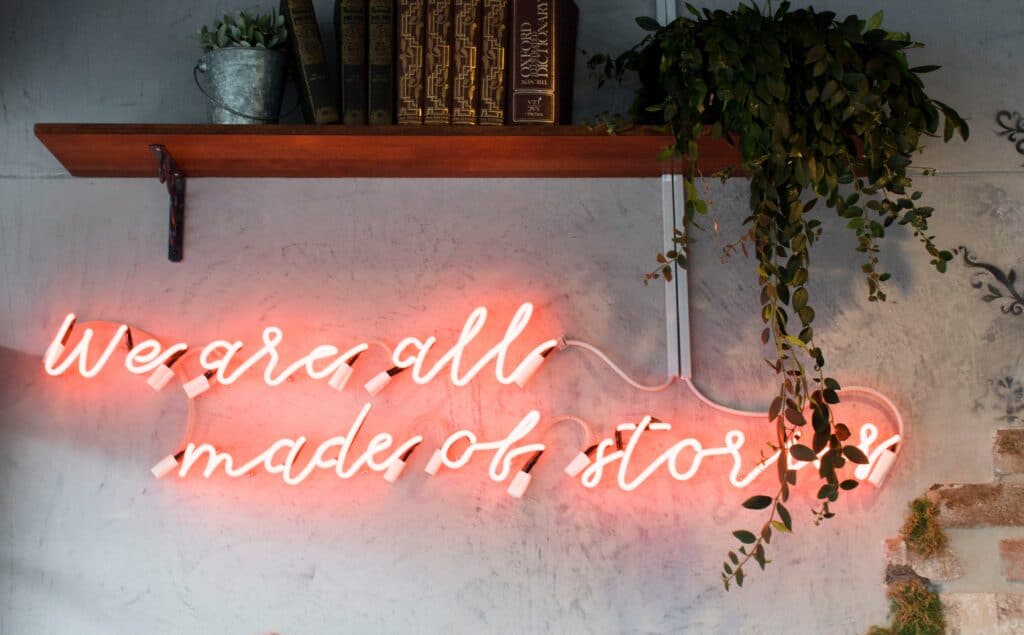We have a mechanism that can conceive unhappiness, difficulty changing habits, relationship problems, frustration, anger, and disappointment. We are usually not aware, but it’s happening continuously and in all of us.
It’s us unconsciously telling stories to ourselves.
“We tell ourselves stories in order to live…We look for the sermon in the suicide, for the social or moral lesson in the murder of five. We interpret what we see, select the most workable of the multiple choices. We live entirely, especially if we are writers, by the imposition of a narrative line upon disparate images, by the “ideas” with which we have learned to freeze the shifting phantasmagoria which is our actual experience.”
— Joan Didion, The White Album
A good story can entertain, motivate, teach valuable lessons, and solidify good habits.
A bad story can demotivate, cause frustration and anger, and curb our capability to be fully ourselves.
These stories are not necessarily false but usually, they don’t tell the entire truth — just one perspective. Another person could look at the same situation and tell a very different story. Telling ourselves stories is natural — we all do it, all the time. There’s nothing inherently wrong with it. That said if we aren’t aware of this happening, we won’t understand how they shape our mood, actions, happiness, and relationships.
An example of such a story:
The event: You submitted a pull request for review after half a day of work. Another engineer asked you to change half of your code and to increase your test coverage.
Your story: A nitpicking a**hole commented on every single thing I did in that pull request; I guess he has nothing better to do. I wish people stopped blocking me from making progress. Why are they always making game of me?!
The other engineer’s story: Some terrible code almost went live today; thank god I checked that pull request! Why does it always have to be me to watch quality? It’s so sad it’s only important to me in this whole company…
A bystander’s story: Whoa, that was some tense back-and-forth in the comments of that pull request. I wish people were just nicer to each other; we all want to do a good job at the end of the day, right?
Roots of these stories
The most common origins of these stories are cognitive biases, our self-image made by / combined with our limiting beliefs, and our fears.
Our self-image and limiting beliefs
Ultimately we all have an idea about what kind of a person we are. This idea subconsciously influences how we think, react, and make decisions. The image is usually closely tied to our fundamental values and worldview. Most of us want to be good people in the end. What ‘right’ is defined by these very values and core beliefs.
Our self-image influences the stories we tell ourselves because we’re looking for ways to find justification in our day-to-day experience.
Thus this image can limit our perceived set of options and understanding of the world around us.
Related to the personas in the previous example:
- I’m the guy who gets things done (might imply that I think others are slowpokes)
- As a professional software engineer, I am the sole guardian of quality in the company (might imply that I think others are careless or unprofessional)
- I’m the kind of person who cares for others’ feelings (might imply that I think others have lower EQ)
Of course, these are simply bits and pieces of the whole image.
In all of the narratives above, there are (hopefully unfounded) assumptions, lots of jumping to conclusions, and unproductive, limiting language. In this particular situation, this locks the actors in the status quo, lowering the hope for change. It feels like a stalemate unless someone is willing to be more open.
By the way, I’ve written a bit about this earlier in the post titled This is how I am
Our fears
Fear also changes the kind of stories you tell yourself. Living in fear means giving up the agency, seeing yourself as a passive spectator or a victim. It means seeing yourself as being controlled by circumstances, the actions of others, or your own emotions. And once the story you tell yourself becomes the story of a victim, you will be more and more likely to think and behave like a victim.
Cognitive biases
A cognitive bias is a systematic pattern of deviation from norm or rationality in judgment.
They are basically ‘shortcuts’ our brains take so they can increase our mental efficiency by enabling us to make quick decisions without any conscious deliberation.
Cognitive biases impact us in many areas of life, including social situations, memory recall, what we believe, and our behavior.
Some relevant and common cognitive biases from the staggering list of more than 180:
Self-serving bias
Self-serving bias is our tendency to blame external forces when bad things happen and give ourselves credit when good things happen. Although it can mean evading personal responsibility for your actions, self-serving bias is a defense mechanism that protects your self-esteem. In the example above, this means that if your pull request gets thumbs up from everyone, you attribute that to you being a fantastic engineer. On the other hand, if you get three comments asking you to change things, you might see others as nitpickers or your environment to be non-supportive instead of realizing you might have some room for improvement.
Confirmation bias
Confirmation bias, also known as confirmatory bias or the “myside bias,” is people’s tendency to seek out information that supports something they already believe. This type of bias affects our critical thinking, causing people to remember the hits and forget the misses — a flaw in human reasoning. People will often cue into things that matter to them (the things that support their own beliefs) and dismiss those that don’t. Think about the other engineer overly obsessed with test coverage.
Authority bias
The tendency to attribute greater weight and accuracy to an authority figure’s opinion is at play here. Authority bias is the tendency to blindly follow or believe the instructions and views of a person in authority. We have a deeply rooted sense of duty to obey authority. How do you react when you get a comment on your pull request from a senior engineer you respect? How about if you get the same comment from a junior who just recently started at the company?
So what can we do about it?
Don’t forget that we are the storytellers – we have full control over the stories we make up.
Everything starts with awareness.
Stories are part of the software of our brains. They influence how we act, what’s important, and what to do when something goes wrong. But every software program has bugs. Awareness is your first step towards debugging.
Stop from time to time and think about the possibility that the story you’ve just created is nothing more than a story. Consider alternative stories. Try telling the same story from other characters’ sides, think about what their narrative would look like.
Next time you find yourself in an upsetting situation, consider changing your story. Try this exercise:
Recognize and acknowledge any feelings of fear. Hint: you may need to look underneath your anger!
Ask yourself, what is it about this situation that is so upsetting? What do you believe to be “true” about it that feels threatening to you?
As with pretty much anything else, fear can be tackled one step at a time. There are ways to re-learn to say what you mean and to do what you feel is right. The good news here is that self-reinforcement works both ways. Once you’ve practiced a bit and proven to yourself that it works (and that it’s less complicated than you thought), it gets easier to continue doing it.
We also must allow ourselves to be wrong. If we want to get closer to objective truths, we have to be able and ready to admit we were wrong, especially in the face of new data. If we can’t admit defeat, it makes us less capable of making discoveries in this world. We can avoid biases by being aware of our belief systems, whether our belief is for a religion, a political ideology, a cultural worldview, etc.. Let’s be open to disconfirmation, and allow ourselves to be wrong.
Self-compassion is an instrumental skill for reducing defensiveness and increasing your self-improvement motivation. It involves being kind and forgiving towards yourself, understanding that you are human and that other humans experience the same sort of experiences and failure, and being able to identify uncomfortable thoughts without judging them.
“Who are we but the stories we tell ourselves, about ourselves, and believe?“
— Scott Turow
Some fuel for further thoughts
What do you look like as a character in others’ stories? Do you like that character? What can you do so that character goes through some positive development?
In case you want to read more about the topics in this article:
- I highly recommend ‘Games People Play’ by Eric Berne from 1964 and it’s sequel ‘What Do You Say After You Say Hello?’ from 1970. The book didn’t age particularly well regarding some topics but the basic principle holds.
- About cognitive bias: check out this beautiful visual map of cognitive biases or if you like textual data more browse the relevant Wikipedia article
The book ‘Buddha’s Brain: The Practical Neuroscience of Happiness, Love, and Wisdom.’ – I know, such a clickbaity title, but trust me, this book is pure gold.



